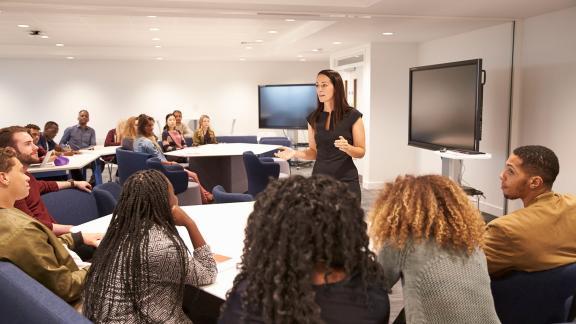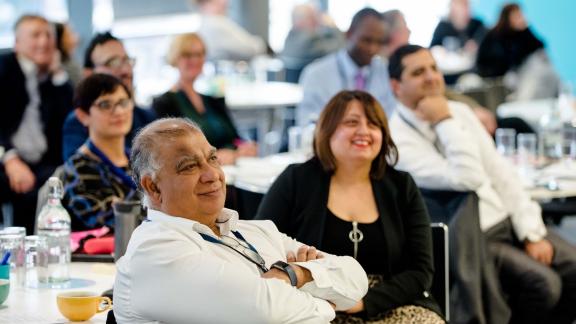As part of LGBT+ History Month, we are keen to showcase some of the LGBTQ+ and ally trailblazers working in health and social care. Below is a list we’d like to add to – contact us and share someone who has inspired you, raised awareness of LGBTQ+ health needs or raised the profile of LGBTQ+ people.
You can also tag us on X and use the hashtag #UnderTheScope.
Dr Hannah Barham-Brown – Hannah is a GP trainee, media spokesperson, activist for LGBTQ+ rights and has presented two TEDx talks. She has been named on the 2018 and 2019 Shaw Trust Power List as one of the 100 most influential disabled people in the UK and has been named one of the Health Service Journal's 100 Most Influential People in Health 2020 and their Campaigner of the Year.
Dr Cecil Belfield Clarke (1894-1970) – Dr Clarke was one of the first black doctors in the UK and established 'Clark's Rule' in paediatric medicine. This simple mathematical formula based on body mass allows doctors to safely calculate the dosage of medicine given to those aged between 2-17.
Dr Michael Brady – Michael was made the first National LGBT Health Advisor at NHS England in 2019. He has played a key role in tackling differences in LGBTQ+ healthcare, including high profile campaigns for pre-exposure prophylaxis (PrEP) and the 'Can't pass it on' campaign.
Christine Burns MBE – Christine is a British political activist known for her work with Press for Change, a key lobbying and legal support organisation for trans people in the UK. She fights for transgender rights, helped put together new employment legislation and the Gender Recognition Act, and wrote the first ever official guidance on trans health for the Department of Health and Social Care.
Lord Michael Cashman – Lord Cashman is a former actor, member of the House of Lords, and founded LGBTQ+ rights charity Stonewall.
Dr Michael Farquhar – Michael is a consultant in sleep medicine and was one of the originators of the NHS Rainbow Badge scheme, designed to promote inclusivity within the NHS. This has played a key role in raising awareness of the challenges faced by the LGBTQ+ community, and the importance of creating supportive environments where everyone can thrive.
Dr Kevin Fenton CBE – Professor Kevin Fenton CBE is Regional Director for London in the Office for Health Improvement and Disparities, within the Department of Social Care. He is a senior public health expert, who has worked in a variety of roles across government and academia - with a remit of tackling health inequalities, urban health and infectious disease prevention. He was named the second most influential black Briton in 2021's Powerlist.
Dr Mags Portman – Mags was called a "pioneer within the sexual health sector". She advocated for access and usage of pre-exposure prophylaxis medication (PrEP) to reduce incidence of HIV/AIDS in the United Kingdom. Portman has been attributed with preventing thousands of new HIV diagnoses through her work ensuring PrEP accessibility.
Alan L. Hart (also known as Robert Allen Bamford Jr) – Alan was an American physician, radiologist, tuberculosis researcher, writer, and novelist. He was one of the first trans men to undergo hysterectomy in the United States. He pioneered the use of x-ray photography in tuberculosis detection and helped implement TB screening programs that saved thousands of lives.
Tracy MyHill OBE – Tracy made an outstanding contribution to LGBT equality during her time in chief executive, deputy chief executive and HR director roles. She encouraged and inspired people to discuss LGBT issues within Swansea and Cardiff and Vale Health Boards and across the UK Ambulance Sector ensuring board level commitment and LGBT staff networks were actively involved in the decision making processes.
Dr Ronx Ikharia – Ronx is a self-made emergency medicine doctor and trailblazing activist, who describes themself as a queer, black, androgynous, intersectional feminist. They have appeared regularly on TV, presenting 'Operation Ouch' (CBBC), ' The truth about boosting your immune system' on BBC One and the acclaimed 'Is Covid racist?' on Channel 4.




